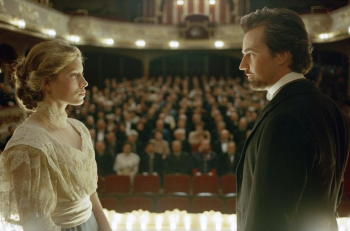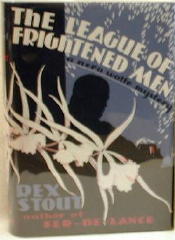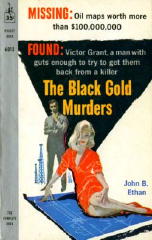Fri 8 Feb 2008
MIKE NEVINS on Michael C. Peacock, The Illusionist, the poetry of Rex Stout, and John B. Ethan.
Posted by Steve under Authors , Columns , Mystery movies , Pulp FictionNo Comments
by Francis M. Nevins
More than seventy years ago the English writer Peter Cheyney, who knew the U.S. about as well as a toad knows existentialism, launched a series of thrillers starring two-fisted FBI agent Lemmy Caution, whose first-person narrative in Cheyney’s version of American English is of a unique eyeball-popping awfulness.
At least I thought it was unique until I stumbled upon Michael C. Peacock’s “Bait” (Clues, May 10, 1931) and its protagonist Whisper Timkins, a good-hearted pickpocket who narrates not only in first person present tense like a Damon Runyon street character but also in dialect like a Harry Stephen Keeler ethnic. “I lowers me hands and flops back onta the chair. Everythin’ is as plain as me Aunt Maggie’s face.” He also uses nouns for verbs and all sorts of other silly said substitutes as if, as he might have put it, there wuz no tomorrah.
“Rule me out,” I lips.
“You’re ruled in…,” he menaces.
“This way,” chills a icy voice.
“As for you, Garvin,” he threats.
“Now use your ears!” he grits….
“Mr. Wade,” Hope yodels, fondlin’ the gat, “have you ever been to Coney Island?”
He…oaths, “We’re leaving for there right away!”
“Terrible,” I throats, mournful.
“Sorta mixed up,” I warbles.
More than half a century after the tale got published for the first and only time, I met the author, a Canadian who had lived in the States only a few years before perpetrating this collage of howlers. I got to like him and he’s dead now so I’ll leave his real name unmentioned. No, he didn’t become a professional mystery writer.
Last month I discovered the finest film music I’ve heard in many a year. The Philip Glass score for THE ILLUSIONIST is full of the hypnotic repetitions that are the Glass trademark but it’s also hauntingly evocative of my beloved Bernard Herrmann. If you love Herrmann’s score for Hitchcock’s VERTIGO, you’ll love this one too, and probably play the CD again and again as I’ve been doing. [The link will lead to a trailer for the film. —Steve.]

In our Poetry Corner this month is THE LEAGUE OF FRIGHTENED MEN (1935), the second of Rex Stout’s Nero Wolfe novels. Wolfe’s adversary in this one is Paul Chapin, who was crippled and apparently emasculated in a fraternity hazing incident at Harvard in 1909 that went horribly wrong. A quarter century later Chapin has attained something of a literary reputation. As members of the group that maimed him begin dying off, the survivors receive anonymous poems that send them scurrying to Wolfe in fright. The first, following the apparently accidental death of a judge in a fall over a cliff, begins:
Ye should have killed me, watched the last mean sigh
Sneak through my nostril like a fugitive slave
Slinking from bondage.
Ye should have killed me.
Ye killed the man,
Ye should have killed me!

Wolfe, who admits that he “cannot qualify as an expert in prosody” but claims to be “not without an ear,” calls the poem “verbose, bombastic, and decidedly spotty.” Suspecting that a few lines were influenced by Edmund Spenser, he has Archie Goodwin pull down the collected works of that poet: “dark blue, tooled…. A fine example of bookmaking… Printed of course in London, but bound in this city by a Swedish boy who will probably starve to death during the coming winter.” The hunt for parallel passages fails but in any event, says Wolfe, “it was pleasant to meet Spenser again, even for so brief a nod.” The second death, the apparent poison suicide of an art dealer, triggers a second poem:
Two.
Ye should have killed me.
Two;
And with no ready cliff, rocks waiting below
To rub the soul out;…
I found the time, the safe way to his throat….
Ye should have killed me.
Then comes the mysterious vanishing of a Columbia psychology professor and yet another effusion:
One. Two. Three.
Ye cannot see what I see;
His bloody head, his misery, his eyes….
One. Two. Three.
We occasionally find Wolfe savoring a volume of poetry but in none of the full-length or short novels is poetry as central as in this longest and perhaps finest exploit of the obese and infuriating genius of West Thirty-Fifth Street.

Of all the silly lines in mystery fiction, one in particular has clung like a barnacle to the underside of my memory for more decades than I care to count. It’s in THE BLACK GOLD MURDERS (1959), a long-forgotten novel by a long-forgotten author — John B. Ethan, if you must know — in which a woman introducing the narrator to two beatniks says: “The one on the right thinks he’s Zen Buddha.” You remember Zen from World Religions 101, right? Wasn’t he Prince Gautama’s kid brother?